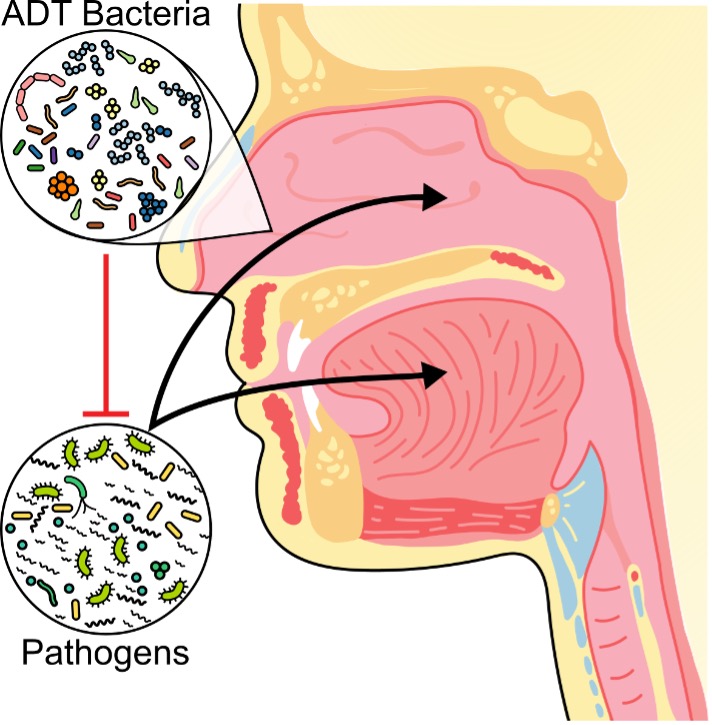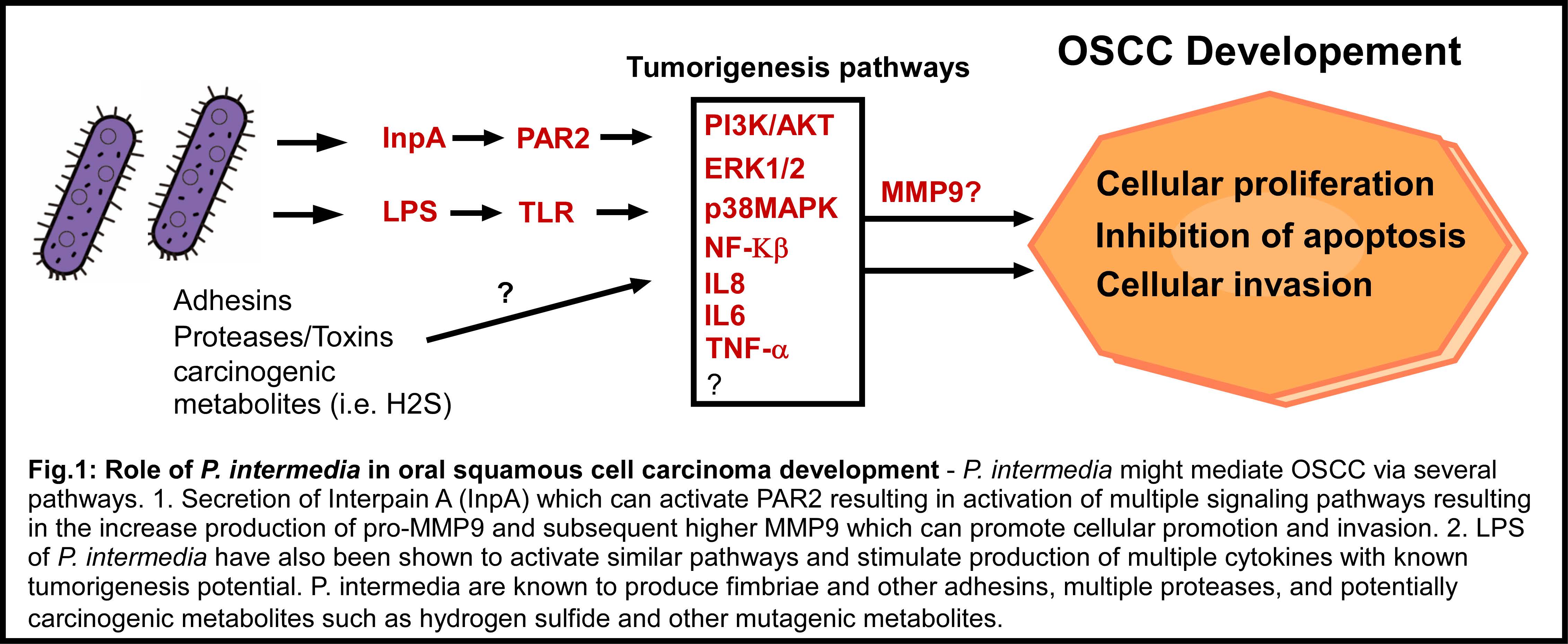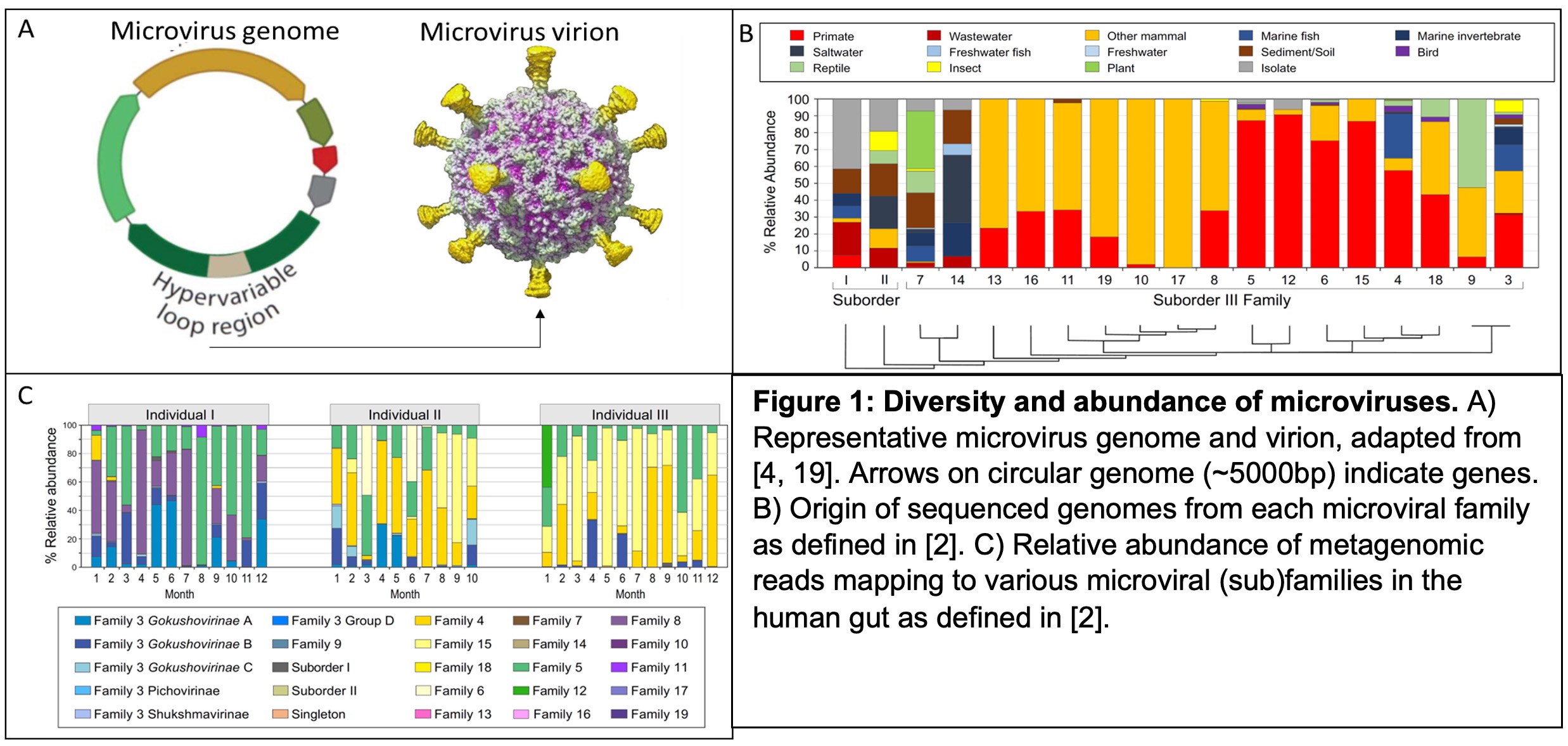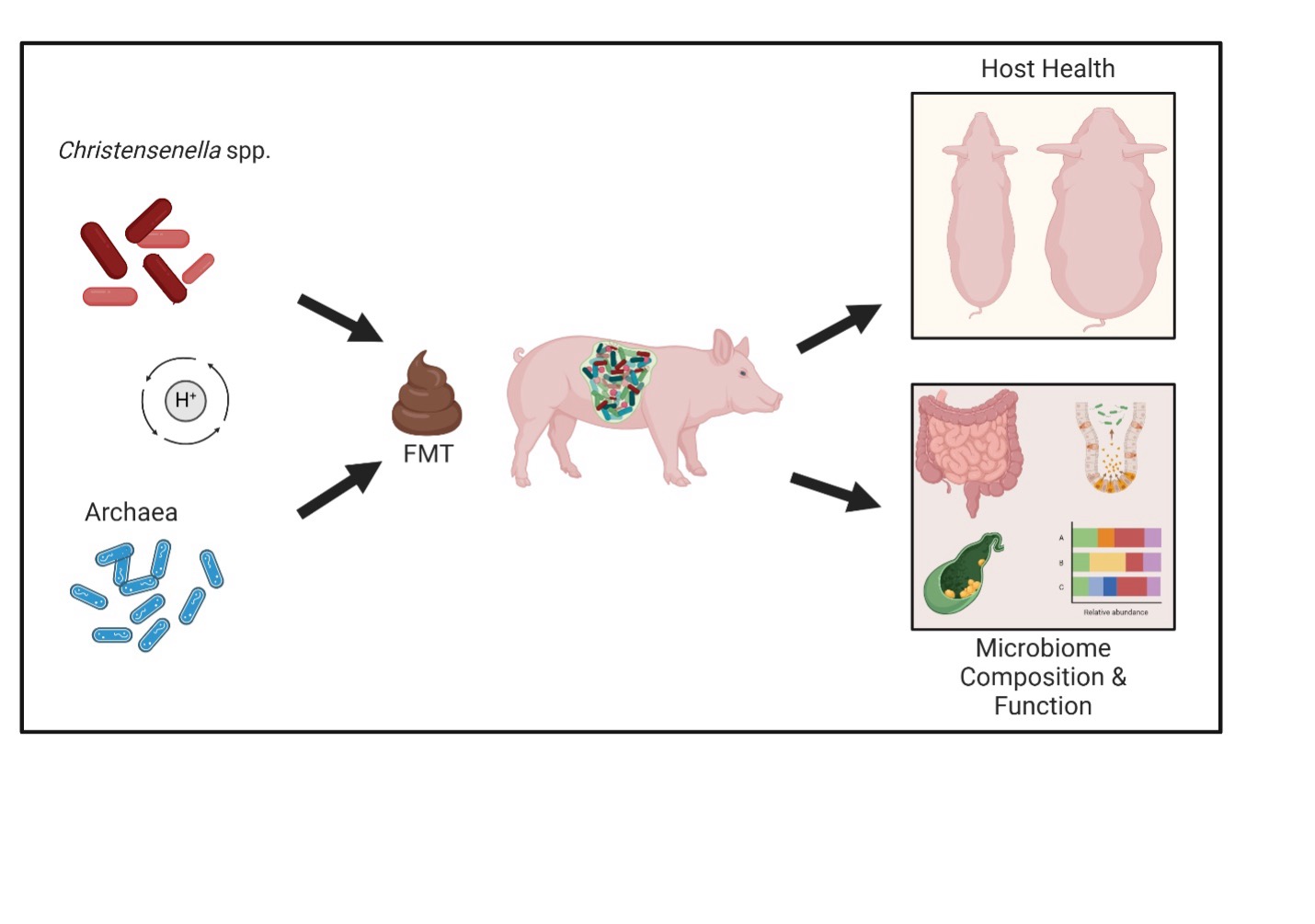Oklahoma Center for Microbiome Research
Research Projects
Project 1: Oral pathogen-triggered progression of oral squamous cell carcinoma.
Research Project Leader: Huang, George, PhD
Mentors: Drs. Gerwald Koehler and Lijun Xia
Dr. I-Hsiu (George) Huang is an Assistant Professor of Biochemistry and Microbiology at OSU-CHS. Dr. Huang worked on his doctorate with Dr. Mahfuzur Sarker at Oregon State University studying Clostridium perfringens. Dr. Huang received postdoctoral training under Dr. Felicia Qi at Oklahoma University Health Sciences Center studying interspecies interactions of pathogenic oral bacteria. He received additional postdoctoral training at the University of Texas Health Science Center at Houston under Dr. Hung Ton-That on cell surface protein assembly in Gram positive bacteria. From 2012-2020, Dr. Huang was an associate professor of Microbiology at National Cheng Kung University where he worked on the pathogenesis of Clostridioides difficile. Now Dr. Huang seeks to understand how the anaerobic oral pathogen Prevotella intermedia stimulates oral cancer formation and progression. For this purpose he developed model systems to detect cancer cell proliferation and metastasis as a phenotype of microbial carcinogenesis. He uses these models to identify genetic traits of carcinogenic bacteria and the corresponding oncogenic signaling pathways. Dr. Huang is mentored by Dr. Gerwald Koehler and Dr. Lijun Xia, who leads the CMRO-COBRE. Dr. Huang strengthens the OCMR-COBRE with expertise in genetics and small animal disease models.
Project 2: Engineering host-determinants of novel gut microviruses.
Research Project Leader: Kirchberger, Paul, PhD
Mentors: Drs. Mostafa Elshahed and Clint Jones
Dr. Paul Kirchberger is a molecular and evolutionary biologist focusing primarily on the biology of mobile genetic elements such as bacteriophages. Dr. Kirchberger trained under Dr. Ellen Zechner and Dr. Kristina Sefc at the Karl Franzens University of Graz, Austria, studying phage-bacteria interactions and phylogenetic reconstruction in eukaryotes, respectively. He obtained his Ph.D. with Dr. Yann Boucher at the University of Alberta, Canada, studying the ecology and evolution of Vibrio cholerae populations. He developed his current research direction while a postdoctoral scientist in Dr. Howard Ochman’s laboratory at the University of Texas, Austin. Dr. Kirchberger discovered that single-stranded DNA phages of the family Microviridae dominate the human intestinal virome. He developed a novel model system to engineer and grow Microviruses through whole genome synthesis and transformation. As a new investigator, he seeks to understand how microviruses influence anaerobic bacterial hosts in the human gut and how their genetic malleability can be used to manipulate the microbiome rationally. Dr. Kirchberger is mentored by Dr. Mostafa Elshahed, an anaerobic microbiologist and metagenomics expert, and Dr. Clint Jones, a veteran virologist, whose expertise greatly complements Dr. Kirchberger’s. To the OCMR-COBRE, Dr. Kirchberger contributes his knowledge and skills in computational and physical analyses of bacteriophages.
Project 3: Characterizing Pathogen-Mediated Production of Secondary Metabolites in the Human Aerodigestive Tract Microbiome.
Research Project Leader: Stubbendieck, Reed, PhD
Mentors: Drs. Paul A. Lawson and Matt Traxler

Dr. Stubbendieck is a geneticist focusing primarily on bacterial interactions and specialized metabolism. His doctoral training was with Dr. Paul Straight at Texas A&M University, where he studied the mechanisms of action, resistance, and sensing of antibiotic linearmycins in a model system of interspecies bacterial competition. Dr. Stubbendieck trained as a postdoctoral fellow with Dr. Cameron Currie at the University of Wisconsin- Madison where he characterized siderophores produced by nasal bacteria to mediate resource competition and identified the biosynthetic potential of human aerodigestive tract microbiomes to produce specialized metabolites. Dr. Stubbendieck is a new investigator who is mapping specialized metabolite biosynthetic gene clusters of aerodigestive microbiota in the nasopharynx. He seeks to determine the identify of antimicrobials produced by commensal microbes that specifically target invading pathogens without harming the microbiota. The insights gained will facilitate the discovery of new bioactive natural products and inform our understanding of ecological interactions within the microbiome. Dr. Paul Lawson, an expert in microbial taxonomy, mentors Dr. Stubbendieck. Dr. Stubbendieck’s expertise in natural product chemistry and specialized metabolites that mediate microbe-microbe, microbe-host, and microbe-virus interactions supports the research of fellow RPLs. The Anaerobic Core facilitates his project by culturing bacteria at the aerobic-to-anaerobic transition and characterizing the metabolites produced by the aerodigestive microbiota.
Project 4: The adolescent microbiome-gut-brain axis as a potential target in opioid abuse disorders.
Research Project Leader: Vazquez Sanroman, Dolores, PhD
Mentors: Drs. Gerwald Koehler and Kyle Simmons
Dr. Vazquez Sanroman is a first-generation, Mexican-born immigrant (Hispanic). She is a neuroscientist and cell biologist focusing primarily on adolescent brain neurobiology. She trained with Dr. Marta Miquel at University Jaime in Spain and Dr. Ferdinando Rossi at the Neuroscience Institute Cavalieri Ottolenghi at the University of Turin, Italy. Her research focused on the neurobiology of psychostimulant effects on the adolescent brain. Dr. Vazquez Sanroman received postdoctoral training as a National Institute for Drug Abuse (NIDA) fellow in the laboratory of Dr. Michael Bardo in the Center for Drug Abuse Research Translation (CDART) funded by NIH-NIDA at the University of Kentucky. There she developed a translational model of negative urgency that provided a more comprehensive understanding of the adolescent neural system in risk-related traits relevant to the design of tailored anti-drug prevention intervention messages. Her research project is unique in testing the hypothesis that brain-derived neurotrophic factor (BDNF) deficiency is associated with brain-gut communication changes relevant in opioid abuse disorders and after oxycodone withdrawal. Convinced that the microbiota plays a role in opioid abuse and recovery, Dr. Vazquez Sanroman is transitioning her research career to include anaerobic microbiology, physiology, and metabolism research approaches. She uses the Anaerobic Microbiology Core to determine microbiome function in opioid-induced dysbiosis. Dr. Vazquez Sanroman brings expertise in understanding the microbiome-gut-brain axis. Drs. Gerwald Koehler and Kyle Simmons at OSU-CHS mentor her.
Project 5: Exploiting trans‐domain syntrophy for the reduction of obesity using biotherapeutic Christensenella
Research Project Leader: Johnson, Niki, PhD
Mentors: Drs. Adel Pezeshki and Joy Scaria
Dr. Crystal (Niki) Johnson is an anaerobic microbiologist specializing in the interactions between bacteria, archaea, and disease, with an emphasis on leveraging microbiome modulation to promote positive health outcomes. She earned her doctorate with Dr. Paul Lawson at the University of Oklahoma, where she studied polyphasic taxonomy and the effects of biocorrosion on energy sector infrastructure. Dr. Johnson received postdoctoral training under Dr. Catherine Stanton at Teagasc, the Irish Food and Agriculture Development Authority, and Dr. Paul Ross at APC Microbiome Ireland, where she worked on projects spanning early life microbiome, fecal microbiota transplantation, metabolic syndrome, and bacteriocin production. As a new investigator, Dr. Johnson aims to discover novel anaerobes and their syntrophic partners to advance translational efforts in tailored microbiome modulation and precision therapeutics. As an OCMR project leader, her lab is investigating how Christensenella (a bacterium) and Methanobrevibacter (an archaeon) cooperate to affect host physiology related to energy harvest. This research will provide the first insights into how trans-domain syntrophy influences obesity progression. Dr. Johnson is mentored by Dr. Pezeshki and Dr. Scaria, who bring extensive expertise in cardiometabolic health, anaerobic cultivation, and porcine trial methodologies.




